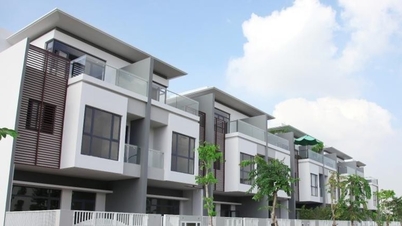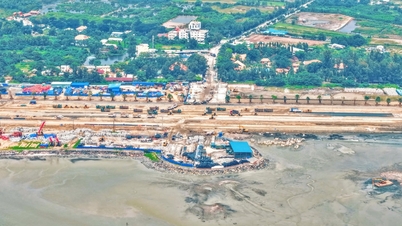According to the latest data from the State Bank of Vietnam , as of August 31, outstanding real estate credit reached about 4.1 million billion VND, up 19% over the same period last year. Of which, outstanding credit for real estate business activities reached 1.823 million billion VND.
Specifically, for urban construction and housing development investment projects, the credit balance is 614,737 billion VND; office leasing projects have a balance of 61,946 billion VND; industrial park and export processing zone construction projects have a balance of 114,274 billion VND.

In addition, outstanding credit balance for eco- tourism and resort projects is 62,487 billion VND; restaurant and hotel projects is 64,560 billion VND; outstanding debt for construction, repair, and purchase of houses for sale or rent is 130,642 billion VND.
In addition, outstanding loans for customers purchasing land use rights are VND 190,113 billion; outstanding loans for other real estate investment and business activities reach VND 584,553 billion.
Regarding this issue, the Ministry of Construction said: Data shows that the real estate market is currently receiving higher credit support than at the end of 2024. However, to ensure sustainable development, it is still necessary to continue to strengthen control of potential risks to maintain market stability.
Meanwhile, in the past 9 months, the total value of corporate bonds issued reached nearly VND398,000 billion, up 44% over the same period in 2024, showing that the capital mobilization channel through bonds is recovering positively. Of which, the real estate industry ranked second, accounting for about 18% of the total issuance value (more than VND70,000 billion), up 35% over the previous year.
In addition to new issuance, real estate businesses also stepped up bond buybacks, with VND43,000 billion bought back in the first 8 months of the year, up 47% over the same period, demonstrating efforts to restructure and fulfill financial obligations after the extension period according to Decree 08/2023/ND-CP.
The Ministry of Construction acknowledged that the real estate bond market has shown signs of improvement, but risks remain, especially when some issuance and repurchase transactions are carried out through organizations related to the issuing enterprise, requiring increased supervision and transparency to ensure market safety and stability.
The data also shows that the corporate bond market fluctuates significantly by month, especially in the real estate sector. In July 2025, the total issuance of corporate bonds reached VND 30,203 billion, of which real estate alone accounted for VND 2,245 billion (accounting for about 7.43% of the total issuance value), at a low level.
In August 2025, total issuance increased to VND 45,688 billion, of which real estate reached VND 17,640 billion (accounting for 38.6%), the highest in the quarter. In September 2025, total issuance decreased to VND 23,703 billion, real estate only VND 3,910 billion (accounting for 16.5%), a sharp decrease compared to the previous month.
The above developments show that credit and bond capital flows are returning to the real estate sector, contributing to promoting liquidity and supporting unfinished projects. However, this recovery still has potential risks, especially when a segment of businesses still rely heavily on loans and bond issuance to rotate finances.
Faced with this situation, the Ministry of Construction recommends that the State Bank proactively and effectively manage monetary policy, directing credit to priority areas, especially social housing projects, worker housing, renovation and reconstruction of old apartment buildings, and commercial housing with prices suitable to people's accessibility.
At the same time, the Ministry of Construction also recommended that the Ministry of Finance strengthen management, inspection and strict control of the issuance of individual corporate bonds; proactively urge and supervise the payment of bonds at maturity to ensure the legitimate rights of investors.
In addition, the Ministry of Construction recommends that the Ministry of Finance needs to synchronously and effectively deploy solutions to develop the capital market and corporate bond market in a sustainable, stable, safe and healthy direction, contributing to meeting the medium and long-term capital needs of the economy.
Source: https://congluan.vn/trust-and-bonds-about-real-estate-risks-10316249.html


![[Photo] The road connecting Dong Nai with Ho Chi Minh City is still unfinished after 5 years of construction.](https://vphoto.vietnam.vn/thumb/1200x675/vietnam/resource/IMAGE/2025/11/04/1762241675985_ndo_br_dji-20251104104418-0635-d-resize-1295-jpg.webp)


![[Photo] Opening of the 14th Conference of the 13th Party Central Committee](https://vphoto.vietnam.vn/thumb/1200x675/vietnam/resource/IMAGE/2025/11/05/1762310995216_a5-bnd-5742-5255-jpg.webp)
![[Photo] Panorama of the Patriotic Emulation Congress of Nhan Dan Newspaper for the period 2025-2030](https://vphoto.vietnam.vn/thumb/1200x675/vietnam/resource/IMAGE/2025/11/04/1762252775462_ndo_br_dhthiduayeuncbaond-6125-jpg.webp)







































































































Comment (0)